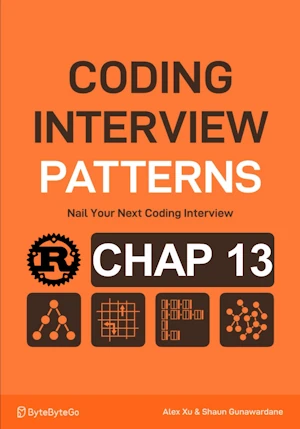Merging Communities

npeople from 0 ton-1- Initially each person belong to a separated community
- When two people connect their communities merge
- Write
connect(x: usize, y: usize)to connect personxto personyand merges their communitiesget_communitiy_size(x: usize) -> usizereturnsx’s community size
The point:
- Union-Find data structure
- Aka Disjoint Set Union (DSU)
- Communities are graphs where each member points to its representative (parent)
- Parents in a parent array.
parent[i]is the parent of personi - Union : connect x to y => connect rep of y to rep of x
- representative (root) of x can be different of parent of x
- size optimization : the rep with the larger community becomes the new rep
- path compression optimization : we make sure each person is directly connected to the new rep (p 284)
- Find : need to traverse x’s parent chain until representative (person whose parent is themselves)
Complexity :
| Time | Space |
|---|---|
| O(1) | O(n) |
- O(1) in time because
find()with size and path compression optimization branches are very short. It is constant-time in most casesget_size()usesfind()so it is amortized O(1)
- O(n) in space because the Union-Find data structure has 2 array of size
n. The space for the recursive call stack is amortized O(1) since the branches are very short
First implementation
About Rust :
- YES : tested on the Rust Playground
struct UnionFind{
size : Vec<usize> ,
parent : Vec<usize>
}
impl UnionFind{
fn new(size: usize) -> Self {
Self {
parent: (0..size).collect(),
size: vec![1; size],
}
}
fn union(&mut self, x: usize, y: usize){
let (rep_x, rep_y) = (self.find(x), self.find(y));
if rep_x != rep_y{
if self.size[rep_x] > self.size[rep_y]{
// If rep_x represent a larger community, connect rep_y community to it
self.parent[rep_y] = rep_x;
self.size[rep_x] += self.size[rep_y]
}else{
// connect rep_x to rep_y otherwise
self.parent[rep_x] = rep_y;
self.size[rep_y] += self.size[rep_x]
}
}
}
fn find(&mut self, x: usize)->usize{ // returns the representative of x
if x==self.parent[x]{
return x;
}
// path compression
self.parent[x] = self.find(self.parent[x]);
self.parent[x]
}
fn get_size(&mut self, x: usize) -> usize{ // in .find(), self can mutate
let rep_x = self.find(x);
self.size[rep_x]
}
}
struct MergingCommunities{
uf : UnionFind
}
impl MergingCommunities{
fn new(size: usize)->Self{
Self{
uf: UnionFind::new(size)
}
}
fn connect(&mut self, x: usize, y: usize){
self.uf.union(x, y);
}
fn get_community_size(&mut self, x: usize)->usize{
self.uf.get_size(x)
}
}
fn main() {
let n = 5;
let mut my_communities = MergingCommunities::new(n);
my_communities.connect(0, 1);
my_communities.connect(1, 2);
println!("{}", my_communities.get_community_size(3)); // 1
println!("{}", my_communities.get_community_size(0)); // 3
my_communities.connect(3, 4);
println!("{}", my_communities.get_community_size(4)); // 2
}